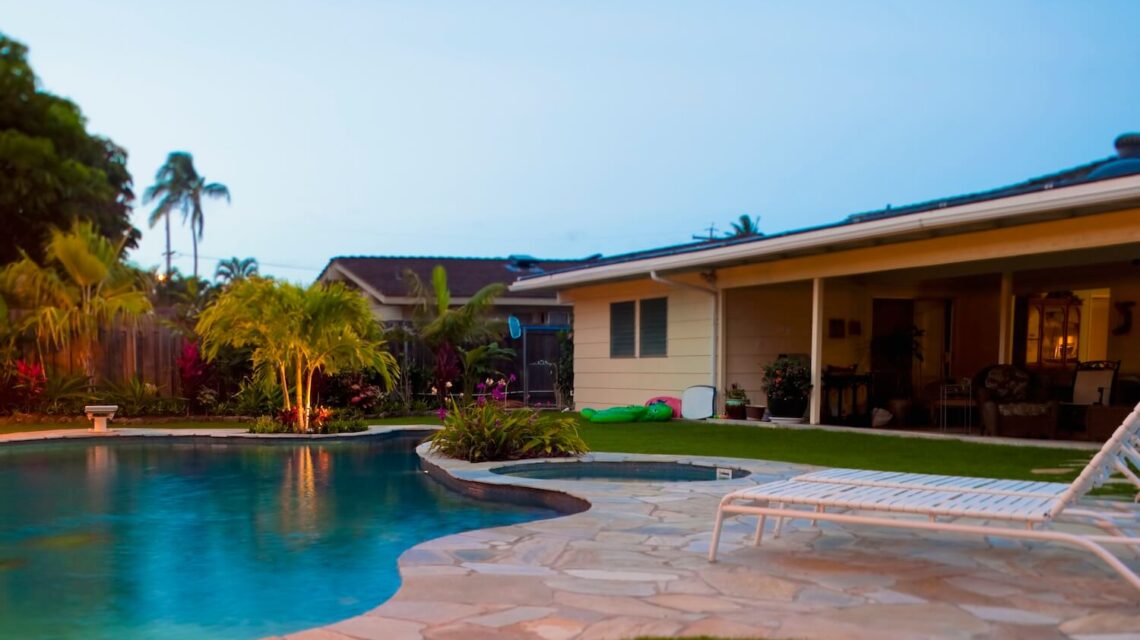Owning a swimming pool is an investment in leisure and relaxation, but it also requires consistent care and attention to keep it in top condition. From cloudy water to malfunctioning pumps, various issues can arise, disrupting your enjoyment and creating costly repairs if left unchecked. Understanding how to troubleshoot these common pool problems will not only save you time and money but also ensure your pool remains a pristine oasis for your family and guests.
In this comprehensive guide, we will explore how to troubleshoot the most common pool issues, what causes them, and how to prevent them in the future.
1. Cloudy Pool Water: Causes and Solutions
Few things are as unappealing as cloudy pool water. It can feel like a mystery when, despite your best efforts, your water loses its sparkle. Cloudy water can be caused by a range of issues, so identifying the right one is crucial to restoring clarity.
Causes:
- Imbalanced Chemicals: When your pool’s chemicals are out of balance, particularly chlorine, pH, and alkalinity levels, the water can turn cloudy. Low chlorine levels reduce the ability to sanitize the pool, leading to the accumulation of contaminants.
- Dirty or Overloaded Filter: The pool filter is designed to remove particles, dirt, and other debris from the water. If it’s clogged, dirty, or malfunctioning, it won’t do its job effectively, allowing tiny particles to remain suspended in the water.
- Excessive Organic Debris: Organic debris, such as leaves, pollen, or dirt, can accumulate in the pool, overwhelming the filter and making the water appear cloudy.
- Calcium Hardness: High levels of calcium in the water can cause cloudiness by creating calcium deposits, which are visible as milky or cloudy water.
Solutions:
- Test and Adjust Chemical Levels: Start by testing your pool water with a reliable testing kit or strips. Check the chlorine levels (should be 1.0-3.0 ppm), pH (should be 7.2-7.6), and alkalinity (should be 80-120 ppm). Based on the results, add the necessary chemicals to bring the levels back into the proper range.
- For low chlorine: Add more chlorine or shock the pool.
- For pH imbalance: Use sodium bicarbonate (baking soda) to increase pH or muriatic acid to lower it.
- Backwash or Clean the Filter: If your filter is dirty or clogged, backwashing can help clear it out. For cartridge filters, remove and rinse them thoroughly. If the filter media is old or excessively worn, replacing it is a good idea.
- Skim, Brush, and Vacuum: Remove large debris using a skimmer net. Brush the sides and bottom of your pool to loosen any dirt or organic material clinging to the surface, and vacuum the pool to remove debris that has settled at the bottom.
Regular pool water testing and filter cleaning should prevent cloudiness from becoming a persistent issue. Additionally, maintaining your pool cover can reduce debris from entering your pool, contributing to clearer water.
2. Green Pool Water: The Battle with Algae
Green pool water is a sign that algae have taken over. Algae growth can occur surprisingly fast, especially in warmer temperatures or if your pool water’s chemistry isn’t properly maintained. Algae thrive in stagnant, unsanitized water and can make your pool an unpleasant and unsafe environment.
Causes:
- Low Chlorine Levels: Algae outbreaks often happen when chlorine levels dip too low, allowing microorganisms to multiply.
- Poor Circulation: Inadequate water circulation creates pockets of stagnant water where algae can flourish.
- Excessive Organic Debris: Organic debris, such as leaves and dirt, can fuel algae growth, especially if not removed regularly.
Solutions:
- Shock the Pool: Shocking involves adding a large dose of chlorine to kill algae. You can use either liquid chlorine or calcium hypochlorite. A good rule of thumb is to use 1 pound of pool shock per 10,000 gallons of water, but for severe algae outbreaks, you may need to double this dose.
- Brush the Pool’s Surface: Algae stick to surfaces, so scrubbing the walls, floor, and steps of the pool is necessary to loosen it. A stiff brush designed for your pool’s surface (plaster, vinyl, fiberglass) will ensure you don’t damage the finish while effectively removing the algae.
- Run the Filter Continuously: After shocking the pool, you need to run the pool filter non-stop for 24-48 hours. The filter will catch dead algae and help clear the water.
To keep algae from coming back, maintain proper chlorine levels, run the pump and filter regularly, and ensure good circulation in all areas of your pool. Additionally, consider using a pool cover during off-seasons or periods of inactivity to minimize debris accumulation.
3. Pool Pump Troubles: Diagnosing Circulation Issues
The pool pump is the heart of your pool’s circulation system. If it isn’t working correctly, you’re bound to face other issues like cloudy water, algae growth, or debris buildup. Troubleshooting pump problems early can save you from more extensive repairs down the line.
Common Pump Issues:
- Pump Won’t Start: Electrical issues, tripped breakers, or motor failure can stop your pump from running altogether.
- Low Water Flow: A clogged filter, closed valves, or air leaks in the system may cause reduced water flow through the pump.
- Loud or Noisy Pump: If your pump is making loud noises, it may indicate worn-out bearings, cavitation (air bubbles in the pump), or improper installation.
Equipment Solutions:
- Check Electrical Connections: Ensure the pump is plugged in, the breaker is not tripped, and all electrical connections are secure. If the motor has failed, it may need to be replaced.
- Clean the Filter and Skimmer Basket: A dirty filter or full skimmer basket can reduce water flow. Clean these components regularly to keep water flowing smoothly.
- Inspect for Air Leaks: Air can enter the pump through loose fittings, cracked O-rings, or improperly sealed lids. Tighten connections, inspect O-rings, and replace seals if necessary.
4. Pool Heater Not Working: Diagnosing Temperature Issues
Nothing is more frustrating than looking forward to a warm swim only to find that your pool heater isn’t working. Pool heaters, whether gas, electric, or solar, can develop issues that prevent them from maintaining the right temperature.
Common Heater Issues:
- Low Water Flow: Heaters require a certain flow rate to work correctly. Clogged filters, air in the lines, or closed valves can reduce flow and prevent heating.
- Gas Supply Issues: For gas heaters, any disruption in the gas supply, such as a clogged line or a faulty valve, will prevent proper operation.
- Sediment Buildup: Over time, sediment can accumulate in the heat exchanger, reducing efficiency and potentially causing damage.
Equipment Solutions:
- Check the Filter and Circulation: Ensure the filter is clean and water is circulating properly through the heater. Many heaters have pressure or flow sensors that shut them off if the flow is insufficient.
- Inspect the Thermostat: Test the heater by adjusting the thermostat. If it doesn’t respond or reach the desired temperature, you may need to replace the thermostat.
- Check Gas Connections: If you have a gas heater, verify that the gas supply is turned on and that the lines are free of obstructions. A professional inspection is recommended if you suspect gas line problems.
5. Pool Leaks: How to Detect and Repair Water Loss
Pools naturally lose some water due to evaporation, but if you notice an unusual drop in water levels, you may leak. Pool leaks not only waste water but can lead to structural damage and increased chemical costs.
Signs of a Leak:
- Rapid Water Loss: Losing more than 1/4 inch of water per day is typically a sign of a leak.
- Wet Areas Around the Pool: Puddles or soggy spots near the pool deck may indicate a plumbing or structural leak.
- Unexplained High Water Bills: A sudden increase in your water bill could mean you’re losing pool water due to a leak.
Care Solutions:
- Perform the Bucket Test: This simple test will help you determine whether the water loss is due to evaporation or a leak. Place a bucket filled with water on the steps of your pool and mark the water levels inside the bucket and in the pool. After 24 hours, compare the levels. If the pool water level drops significantly more than the bucket, you likely leak.
- Inspect Visible Plumbing: Check all visible pipes, fittings, and connections for cracks, leaks, or corrosion.
- Consult a Leak Detection Specialist: If you suspect a leak but can’t locate it, professional leak detection services use specialized tools and techniques to find hidden leaks without damaging your pool.
6. Regular Maintenance: Your Best Defense
The best way to troubleshoot and prevent common pool problems is to establish a consistent maintenance routine. Regular maintenance will help catch small issues before they become major problems and keep your pool water clean and safe.
Pool Maintenance: When to Call an Expert
While regular DIY maintenance can help keep your pool in good condition, there are several compelling reasons why calling a professional pool maintenance service is often the simpler and more cost-effective choice.
1. Pool Expertise and Experience
Professional pool technicians possess the knowledge and experience needed to diagnose and address a wide range of issues. They are trained to spot potential problems that a typical pool owner might overlook, from subtle chemical imbalances to hidden leaks. Their expertise allows them to efficiently resolve issues, reducing the risk of further complications that could arise from improper handling.
2. Time-Saving Pool Convenience
Maintaining a pool requires significant time and effort, especially during peak swimming seasons. By hiring an expert, you free up your valuable time to enjoy your pool rather than spend it on upkeep. Professionals can handle routine tasks such as cleaning, chemical balancing, and equipment maintenance quickly and effectively, ensuring your pool is always ready for use without the hassle.
3. Typical Cost-Effectiveness
While hiring a professional may seem like an added expense, it can save you money in the long run. Pool maintenance experts can help identify issues before they escalate into costly repairs. For example, catching a small leak early can prevent extensive water loss and structural damage that would require expensive repairs later. Additionally, professionals often have access to bulk chemicals and equipment at lower prices, which can translate to savings for you.
4. Advanced Pool Equipment and Techniques
Pool maintenance professionals come equipped with advanced tools and techniques that may not be readily available to the average homeowner. This means they can perform tasks more effectively and efficiently, from deep cleaning the pool surfaces to resolving complex mechanical issues. By leveraging their resources, you can achieve a level of maintenance that enhances the longevity and performance of your pool.
5. Swimming Pool Peace of Mind
Hiring a professional pool service provides peace of mind, knowing that your pool is in capable hands. You won’t have to worry about whether you’re performing tasks correctly or if you’re missing something important. With a professional service, you can rest easy knowing that your pool will be safe, clean, and well-maintained, allowing you to focus on relaxation and enjoyment.
Conclusion
Troubleshooting common pool problems doesn’t have to be a daunting task. With regular maintenance, testing, and a good understanding of your pool’s equipment, you can prevent most issues from arising. Whether it’s balancing chemicals, cleaning filters, or addressing pump issues, staying proactive will help keep your pool pristine and enjoyable. However, when in doubt, don’t hesitate to contact a professional pool care company to ensure your pool remains in top condition all year round.
By staying vigilant and informed, you can fully enjoy the benefits of your pool, knowing it’s safe, clean, and always ready for a refreshing swim.




